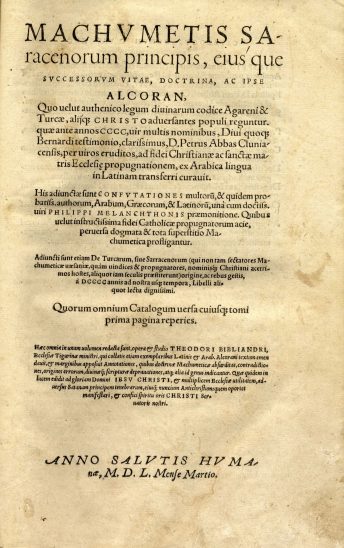Machumetis Saracenorum principis, eiusque successorum vitae, ac doctrina, ipseque Alcoran. His adiunctae sunt confutationes. THREE PARTS IN ONE VOLUME.
Qur’an. Translated by Theodor Bibliander
Synopsis
Copy of the so-called second edition in the variant, with the preface by Ph. Melanchthon. The three parts comprise of:
Part 1: Machvmetis saracenorvm principis,……Alcoran;
Part II: Confviationes legis Machvmeticae, qvam vocant Alcoranvm; Part III: Historiae de Saracenorvm sive Tvrcarvm……rebus gestis; an extremely rare and important work.
“The first printed translation of the Qur’an at all. The text of the Latin Koran translated by Bibliander comes from an Arabic manuscript, which was acquired in the 12th century by Pierre de Cluny and Bernard of Clairvaux on the occasion of their visit to Toledo. Pierre de Cluny charged the Englishman Robert of Kent, who also was staying in Toledo at the time, to translate this manuscript into Latin. “(Enay).
It seems that this translation was copied many times. Martin Luther was in possession of one of these versions four hundred years later. He entrusted it to Bibliander for publication. Apart from this text version, Bibliander used three other manuscripts which he had found additionally. He handed over his translation to his friend, Johannes Oporin, who was a famous printer in Basle. However, the composition and the finished printed sheets were confiscated by the authorities on 1 August, 1542. In the presence of the Council of Basle, protracted negotiations were started, as a consequence of which Johannes Oporin was sentenced on 30 August and taken into custody for a short time. It was only due to the resolute intervention of Luther and Melanchthon that the destruction of the Composition and the printed sheets was prevented. Finally the Council of Basle approved of the publication on December 7th, 1542 on the condition that the edition did not mention either the name of the city (i.e. the place of publishing) nor the name of the printer. Moreover the decree stated that Luther had to contribute a preface to this edition and that the book would be allowed to be sold only from Wittenberg. After all this, the Qur’an was nevertheless put for sale in the spring of 1543. It became immediately a huge success, so that another two editions were published in the same year, which all had variations!
As it was much sought after, another edition (which was generally called the second edition) was published in Basle in 1550. In Zurich – the place of residence of Bibliander – another edition came out in the same year. It was published again in 1556.
Hence, a total of six editions of the so-called “Bibliander-Koran” was published, and all of them differ. It remains for a future study to show the distinctive features of these six editions.
Part II contains a sequence of remarks on the moral and religious instructions given by the Prophet Mohammed; among others some given by Pope Pius II and Nicolas de Cusa. However, it mainly contains the refutation theory by Johannes VI. Kantakuzenus. Part of these texts were printed in two columns, partly in Greek with the Latin translation vis-à-vis. Part III contains writings on the Saracens and the Turks as well as on the Mongolian invasion of Timur. Compared to the preceding prints this part has been extended.
Theodor Biliander (Buchmann), (1504 – 1563) was an Orientalist and Protestant theologian, successor of Zwingli and professor in Zurich. He was a well – known philologist and a famous expert in all Semitic dialects. He was therefore extremely capable of revising the manuscript of Robert von Kent.
Bibliander had in view unification of mankind as his supreme goal. He published several other books along these lines and turned towards Christians, Jews and Muslims in order to show…”in which doctrines they correspond to each other and in which points they disagree…” However, his liberal publication “On the supreme, legitimate and ever lasting autocracy of the world” was confiscated and is kept today in a manuscript form in the Central Library of Zurich.
The open-mindedness and generosity of Bibliander, his universalism, all this was incompatible with the narrow predestination theory of his time. Severe confrontations arose which resulted in Bibliander’s removal from office due to “feeble-mindedness”. (Interestingly he was allowed to keep his salary and his official residence). His numerous papers that were published after 1562 prove how little the reason for his removal was true. One of the best geniuses of Protestant was finally defeated by public opinion. (Mohammed and the Holy Qur’an, edited by Marc-Edouard Enay, Hamburg 1995).
Bibliographic References: Cf. Göllner 792/793 (note); Benzing, Luther 2766-68.






